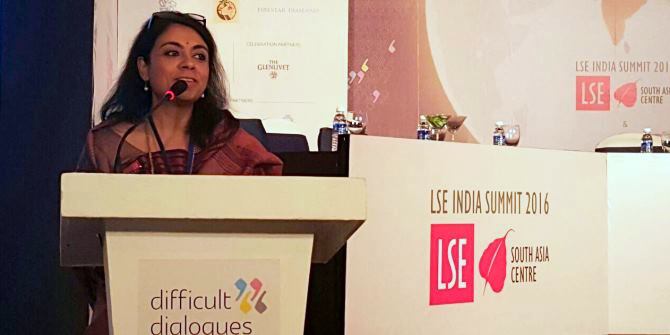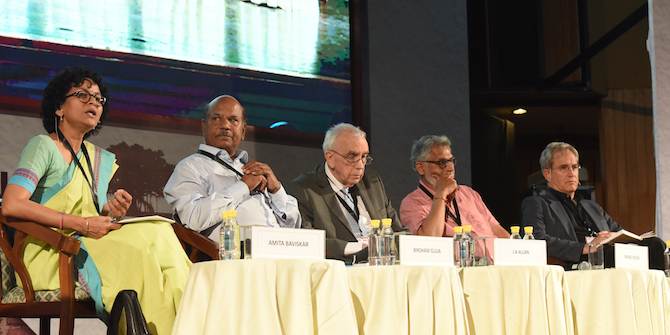 Siddharth Varadarajan recently appeared on the West Asia panel at the first LSE India Summit. During the conference he spoke to Mukti Jain Campion about his career as a journalist, the problem of corporate and government pressure on the media in India, and how his new platform The Wire is trying to re-imagine media ownership.
Siddharth Varadarajan recently appeared on the West Asia panel at the first LSE India Summit. During the conference he spoke to Mukti Jain Campion about his career as a journalist, the problem of corporate and government pressure on the media in India, and how his new platform The Wire is trying to re-imagine media ownership.
MJC: How did you end up as a journalist?
SV: I studied for my BSc and MSc in Economics at the LSE. From there I went on to enrol for a PhD in Economics at Columbia University New York. I was working on the Soviet economy, which in the midst of my research collapsed and I never really made a transition to another topic. Around the same time – we’re talking now end of the ‘80s, early 90s – I got a job as a lecturer in economics at NYU so I started teaching and keeping one foot in my doctoral studies. But my real heart was in international affairs analysis so I began to freelance for an Indian magazine called Frontline. I realised I enjoyed it and it paid well so I figured it’s a good career option, especially since I had no intention of completing my DPhil. When I moved back to India from New York, my first preference for working was with a newspaper. I interviewed with the Times of India and was offered a job as a lead writer and never looked back.
What have been your career highlights as a journalist?
It’s hard to pick one or two things but I’ve enjoyed reporting from the field – I had the chance to cover Jammu-Kashmir, I went to Afghanistan during the Taliban time, I was in Yugoslavia to cover the NATO bombings in 1998. And then of course in 2011 I became Editor of the Hindu. Running one of India’s most important and largest national dailies was important and also very exciting. Every journalist aspires to be an Editor so that definitely figures as one of the highlights.
You’ve obviously got a long view now of the way that journalism has developed in India over the last 20 years. Do you feel that the freedom and independence of the press has been maintained in that period?
I think freedom of the press and its independence has come under considerable pressure in the last two decades. Not so much from the government, but from “market forces”. So the commercialisation and corporatisation of the media has affected the quality of journalism in a variety of ways. There is less space for serious introspective reportage, and many subjects don’t get the kind of coverage they need because proprietors and media houses don’t consider them important. There’s no censorship, nobody is saying “you can’t do that”, it’s just that the resources aren’t available.
In addition you have official pressure tactics, the law of criminal defamation is used in some states. I myself when I left The Hindu had (and still have) three criminal defamation cases against me filed by the Tamil Nadu government because they didn’t like stories that we ran. These things linger around for years and I suppose they act as a pressure tactic on journalists and editors. The courts can also be quite, shall we say “intolerant” – we’ve recently seen the Maharashtra High Court targeting Arundati Roy for an article that she wrote which was critical of the government’s handling of left wing extremism. So there are these levers, and then you have these government ministers who don’t officially have any lever to put pressure but they have been known in the past and now to call up a proprietor and say, “why have you done that? Retract it”.
This pressure happens in any society, but given the nature of the ownership of the media in India some of them are more susceptible. Many are elected politicians. The majority aren’t but still have vulnerabilities because the media industry itself is excessively dependent on advertising and readers’ subscription fees are not very high, so we are talking of dependence to the magnitude of 90-95% in the case of some newspapers.
We’ve heard during the Summit about stories that don’t get covered in the mainstream, for example the impact of repeated droughts on farmers. Do you see that as a self-censorship process?
I wouldn’t cite that as an example of self-censorship because essentially newspapers don’t see rural reporting as a beat. So it’s self-censorship of an entirely different magnitude. There are vast areas that are simply locked off the reporting horizon.
Is that advertiser-driven, or because there is just because there is no interest?
I can’t even say. You know, sometimes it’s just the crass attitude of proprietors who say “my readers are all prosperous upper-middle class people in Bombay and Delhi, are they really interested in drought?” I would say even if your readers are affluent they are interested. If they’re not it’s your job to get them interested, right? But many proprietors, and hence editors, tend to take this very narrow view as to what is news.
There’s this whole idea that news should be entertaining, some of these pernicious ideas have made deep inroads to the Indian editorial culture. And as a result important things don’t get covered. There was a case of women dying in Chhattisgarh from sterilisation operations that were botched – 18 or 19 women lost their lives and you could trace the negligence back to the government. But TV channels – which we quite happy to spend tens of thousands of pounds to cover the Prime Minister’s speech in Madison Square Garden in New York – were not bothered to send a crew to Chhattisgarh to get what I believe is a far more compelling and vital story.
There is also self-censorship in the sense that if a story is politically sensitive – particularly with the current government because many of its ministers are really quite intolerant when it comes to criticism or negative coverage. So you have a situation where newspaper proprietors or editors say “do we really want to run this story?”, or “let’s blunt some of the edges off”. This has always happened in a certain way, but I think the self-censorship in relation to certain types of political stories has increased.
You’ve now got a new venture – tell me about that.
The Wire is India’s first non-profit mainstream news platform. My co-editors, Sidharth Bhatia and MK Venu, and I deliberately conceived of it as a non-profit space because we were aware of the effects that overdependence on advertising, or on investors, shareholders and venture capitalists can have on the nature of editorial decision making. Many of the ills that afflict the Indian media are the result of that ownership structure.
We asked, can we reinvent mainstream media as a new arrangement in the public sphere between citizens, readers and journalists? A media where we depend on the reader and well-meaning philanthropists who recognise the value of independent journalism to pay for the kind of platform that we wanted to create? So far we’ve been at it for about 8-9 months, we managed to raise the first amount of money. It’s been an entirely pro-bono venture for the last 8 months but now we will be able to pay contributors and hire a few journalists, have an office, pay ourselves a salary! So I think things are looking up – it’s very exciting, people see the fact it is non-profit as very refreshing.
Can you give an example of the sort of stories The Wire has covered that you don’t think would have got covered in the mainstream media in India?
A lot of political stories: we were the first to call out the Indian Cultural Minister when he made an absolutely appalling statement referring to a former Indian President as “a patriot despite being a Muslim”. He said this in a television interview and it passed without comment for days, until we said “hang on a minute, how can the minister talk like this?” And then of course all hell broke loose. It’s a different matter that this minister and the Prime Minister don’t care so he is still in his job – in any other democracy he would have been out.
We do a lot of political reporting that is much more bold than what you get to read in the conventional media. We ran an important piece on the major Telecomms company Airtel and the problems that have emerged out of the first audit it has been subjected to, how it’s overcharged the government tens of millions of dollars. We are also one of the only platforms, perhaps the only one in India, that does sustained high quality science reporting – nobody else bothers about science in this country. Culture. These are all areas that have been excluded by the media.
In the examples you gave of the political coverage, have you had any comeback from the politicians on that?
We hear from here and there that they are upset but there’s no pressure. I’m quite confident that the nature of our enterprise, the fact we are financially independent, editorially independent and experienced, you’d have to be a pretty ignorant politician to think you can try to browbeat us! If it does come we will weather it.
This post is an edited transcript of a recorded interview. Listen to the full podcast here.
Cover image credit: Carol Mitchell CC BY-ND 2.0
Note: This article gives the views of the author, and not the position of the South Asia @ LSE blog, nor of the London School of Economics. Please read our comments policy before posting.
About the Authors
Siddharth Varadarajan, an LSE alumnus, is a journalist and a Founding Editor of The Wire.
Mukti Jain Campion is a radio producer and Founder of Culture Wise, an independent company which produces documentaries for BBC Radio.







